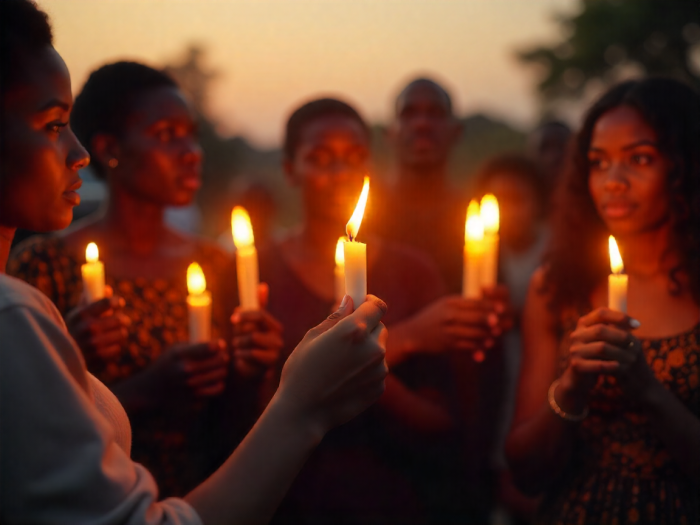
Some questions never fade. They echo through the bones, restless, like a heartbeat that refuses to quiet down.
For queer Nigerians, one question never leaves: What MORE must I do to be safe when I have followed every rule, when I have done everything I was told would protect me?
It is not a plea for pity. It is the voice of exhaustion, the kind that seeps into your spine after years of walking on glass. You learn to fold yourself into corners, to swallow your laughter, to measure every word before it leaves your mouth. You shrink until you almost vanish, praying that invisibility might buy you peace.
And still, the world comes knocking. Another headline. Another body. Another name carved into memory too soon. You realise that no matter how quiet you become, the world still hears your difference like a siren.
They told us safety lives in silence. They said, Do not wear that. Do not walk like that. Do not laugh that loud. Do not exist too freely. So we obeyed. We learned to live half-lives. To smile carefully. To love in code. To disappear before danger could spell our names.
But obedience does not save us. Safety here is not earned. It is a lottery, and luck rarely calls our number.
When Hillary was killed, something inside me cracked. He could have been me. He was me. Young, hopeful, dreaming in colour inside a country painted grey. They beat him and threw him off a building, as if the sky could wash away their sin. And while he fought for his last breath, the internet laughed. His dying became gossip, entertainment, noise.
The cruelty is not only in the violence. It is in the silence that follows. The kind that hangs heavy after the body is gone. The kind that hides behind scripture and respectability. Faith, so loud in this country, grows quiet when it comes to our deaths. Pastors and imams preach love on Friday and Sunday, but blink away our burials by Monday. Our names become prayers no one dares to say aloud.
The law gave them permission. The Same-Sex Marriage (Prohibition) Act handed our lives to hatred wrapped in legal paper. It showed the nation that violence is virtue, that love is a crime, that humanity can be legislated away. That law not only criminalised affection, but also criminalised breathing freely. It turned neighbours into informants. It made monsters of ordinary people.
I still think about my friend who was murdered in Port Harcourt. His name trended for a few days. His death did not travel far enough to stir outrage. They called it “unfortunate,” as if death were a small mishap. But I still hear his laughter sometimes. I still see what his teeth looked like when he smiled. I still see his well-groomed hair. And it hurts, knowing the world forgot him before he was even gone.
This is what it means to live as a queer Nigerian. You learn to carry ghosts like souvenirs. You learn to dance with fear. You learn to keep living even when it feels like the world wants you gone.
And yet, we wake. We love. We build. We hope.
Hope, for us, is not fragile. It is rebellion. It is the refusal to die quietly. It is the decision to keep breathing when breath itself is dangerous.
I dream of a future where I do not have to hide my tenderness. Where laughter does not invite suspicion. Where love does not require disguise.
That future will not fall like rain. It will be carved from courage, resistance, and the stubborn will to stay alive. It will come when allies stop whispering and start standing. When laws are rewritten. When hearts learn softness again. When faith remembers that love was never meant to exclude.
Sometimes, I fear I will not live to see it. But if I do not, I want to believe my living helped build its foundation.
Because I am tired. Tired of shrinking. Tired of watching faces like mine become hashtags and hashtags become silence. I want to breathe without apology.
So I ask again: What must I do to be safe when I have done everything in the safety manual?
The truth is, I cannot save myself alone. None of us can. Safety is not a private achievement. It is a collective promise. Until this country learns to see queer lives as human lives, we are all living in danger, no matter who we love.
Still, inside me, hope beats like a stubborn drum. It will not stop. It hums that one day, my existence will not feel like resistance. That one day, love will step into the sunlight unafraid. That one day, names like Hillary’s will not be whispered as victims, but celebrated as seeds that refused to die.
Because the fight for safety is the fight to live fully. And as Maya Angelou said, freedom is the song the caged bird sings, not because it is free, but because it believes in flight.
Time will answer our question, slowly, painfully. But time is slow, and we are running out of breath.
Zora Neale Hurston wrote in Their Eyes Were Watching God: “There are years that ask questions and years that answer.”
This may be the year that asks. But someday, a year will come that answers. And when it does, may it call our names not as victims, but as victors who dreamed of safety and made it real.
End Credits: As morning unfurls softly over the hills in Dawaki, Oghenefejiro Adjerhore writes for WHER, carrying the ache of those who stay, still believing that even in a hard country, love can learn to bloom again.
